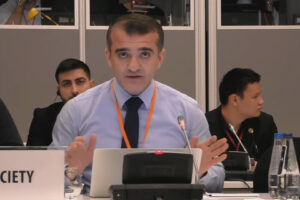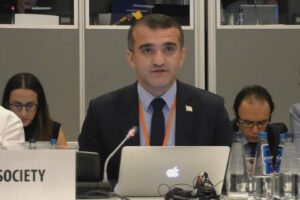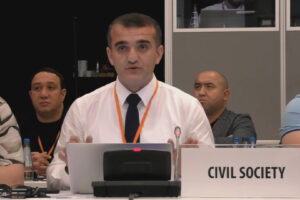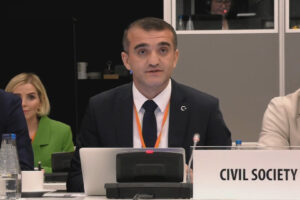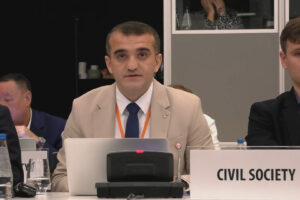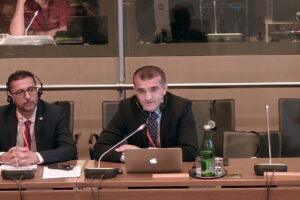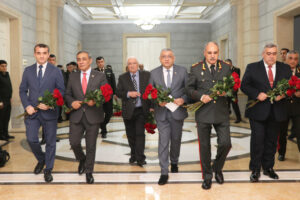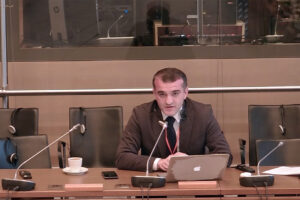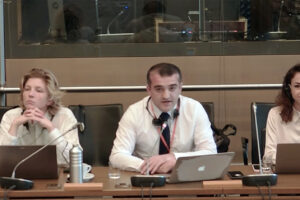“There are equal political opportunities for everyone in Azerbaijan” – Ahmad Shahidov criticized double standards towards Azerbaijan at the OSCE Warsaw Meeting
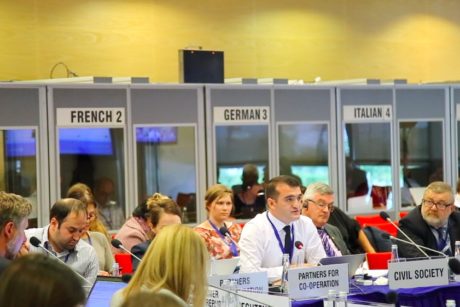
On September 13, the Human Dimension Implementation Meeting (HDIM) of OSCE participating States, organized by OSCE Office for Democratic Institutions and Human Rights (ODIHR) continued its work in Warsaw, Poland. Representatives of OSCE participating States, OSCE institutions, and OSCE executive structures, representatives of inter-governmental organizations, legal professionals, representatives of civil society and researchers from 57 participating States took part in discussions.
Taking an active part in discussion on the topic of “Ensuring equal enjoyment of rights and equal participation in political and public life ”, Head of Azerbaijan Institute for Democracy and Human Rights Dr. Ahmad Shahidov gave detailed information about the socio-political situation in Azerbaijan and noted the equal opportunities for all the parties and persons participating in the country’s political scene, the existence of healthy competition between the authorities and the opposition.
In the background of recent processes in the world, the fascist nationalist political forces in many countries, especially in the United States and other Western countries, are strengthening, as well as the intolerance, discrimination and acts of violence increased in these countries, said human rights defender. According to Ahmad Shahidov, current US President Donald Tramp’s discriminatory policy towards Muslims and Latin American countries is unacceptable, and a number of leading international human rights organizations remain silent on these facts. This is a double standard, and this should be stopped.
PS. The Human Dimension Implementation Meeting (HDIM) of OSCE participating States is Europe’s largest annual human rights and democracy conference. It is organized every year by the OSCE Office for Democratic Institutions and Human Rights (ODIHR) as a platform for the 57 OSCE participating States, the OSCE Partners for Co-operation, OSCE structures, civil society, international organizations and other relevant actors to take stock of the implementation of OSCE human dimension commitments, discuss associated challenges, share good practices and make recommendations for further improvement.
Mövzu
Oxşar xəbərlər
There was tension between the Armenian and Azerbaijani representatives at the OSCE meeting in Vienna
“There are equal political opportunities for everyone in Azerbaijan” – Ahmad Shahidov criticized double standards towards Azerbaijan at the OSCE Warsaw Meeting
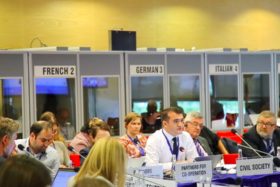 13 September 2017
13 September 2017
On September 13, the Human Dimension Implementation Meeting (HDIM) of OSCE participating States, organized by OSCE Office for Democratic Institutions and Human Rights (ODIHR) continued its work in Warsaw, Poland. Representatives of OSCE participating States, OSCE institutions, and OSCE executive structures, representatives of inter-governmental organizations, legal professionals, representatives of civil society and researchers from 57 participating States took part in discussions.
Taking an active part in discussion on the topic of “Ensuring equal enjoyment of rights and equal participation in political and public life ”, Head of Azerbaijan Institute for Democracy and Human Rights Dr. Ahmad Shahidov gave detailed information about the socio-political situation in Azerbaijan and noted the equal opportunities for all the parties and persons participating in the country’s political scene, the existence of healthy competition between the authorities and the opposition.
In the background of recent processes in the world, the fascist nationalist political forces in many countries, especially in the United States and other Western countries, are strengthening, as well as the intolerance, discrimination and acts of violence increased in these countries, said human rights defender. According to Ahmad Shahidov, current US President Donald Tramp’s discriminatory policy towards Muslims and Latin American countries is unacceptable, and a number of leading international human rights organizations remain silent on these facts. This is a double standard, and this should be stopped.
PS. The Human Dimension Implementation Meeting (HDIM) of OSCE participating States is Europe’s largest annual human rights and democracy conference. It is organized every year by the OSCE Office for Democratic Institutions and Human Rights (ODIHR) as a platform for the 57 OSCE participating States, the OSCE Partners for Co-operation, OSCE structures, civil society, international organizations and other relevant actors to take stock of the implementation of OSCE human dimension commitments, discuss associated challenges, share good practices and make recommendations for further improvement.
 @
@









